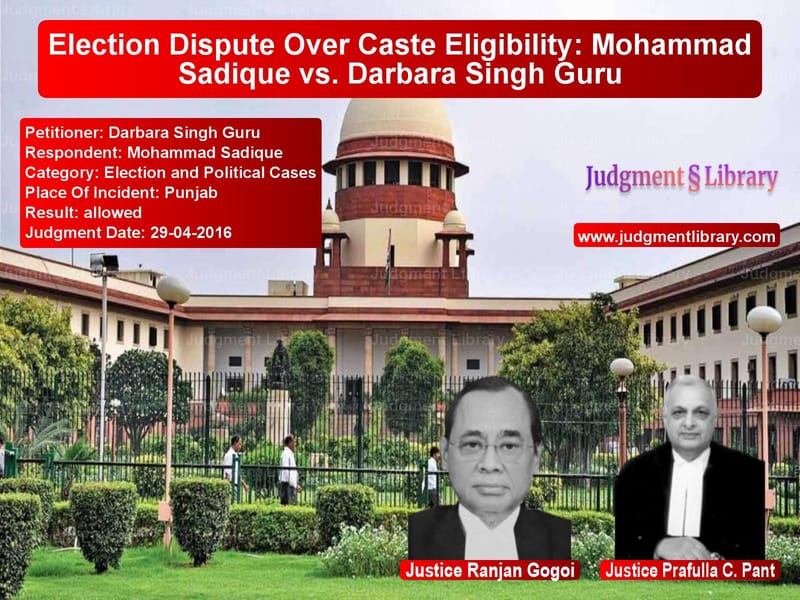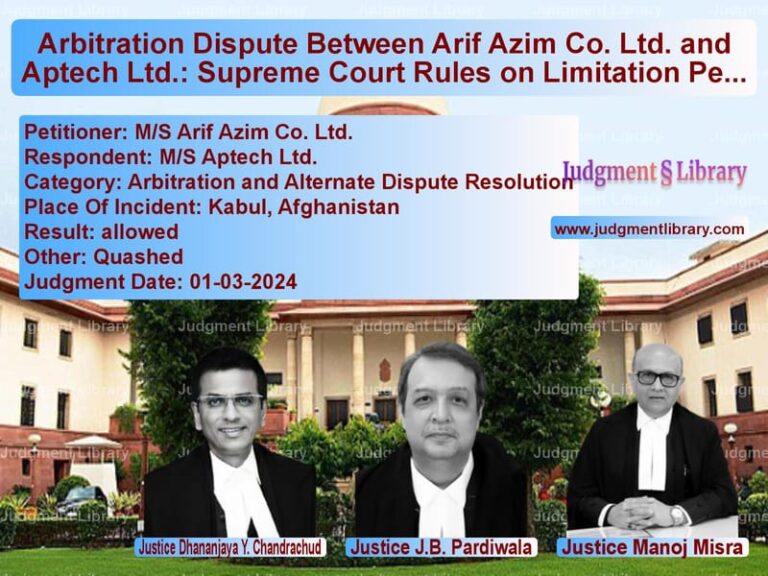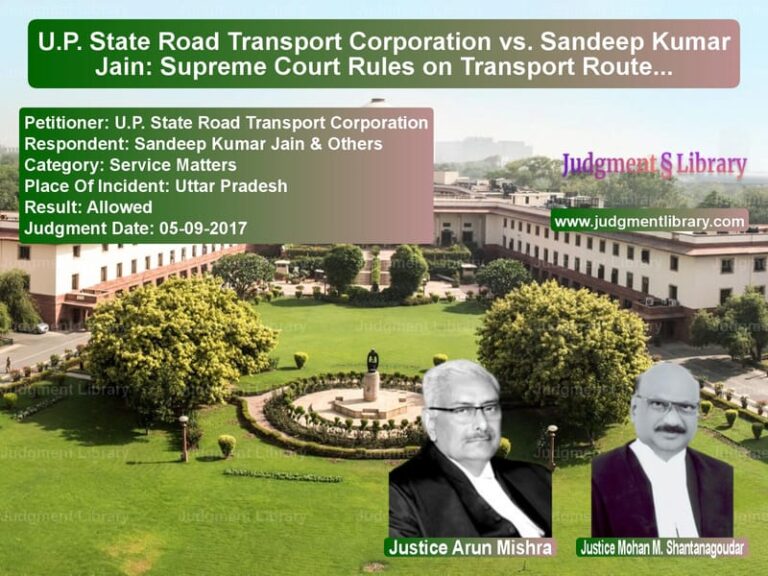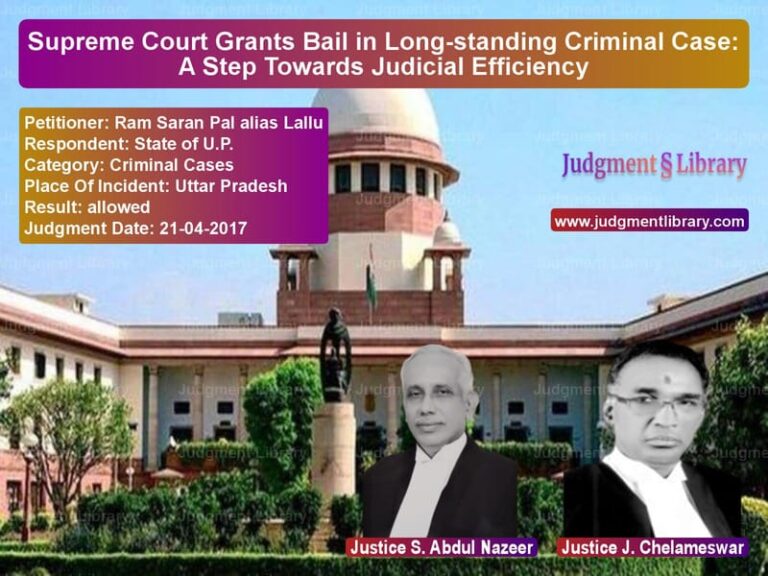Election Dispute Over Caste Eligibility: Mohammad Sadique vs. Darbara Singh Guru
The Supreme Court of India, in its judgment dated April 29, 2016, delivered a landmark ruling in the case of Mohammad Sadique vs. Darbara Singh Guru. The case revolved around the eligibility of the appellant to contest elections from a Scheduled Caste (SC) reserved constituency despite being born into a Muslim family. The Court had to decide whether a person who converted to Sikhism could claim Scheduled Caste status and consequently be eligible to contest elections from a reserved constituency under the Representation of the People Act, 1951.
Background of the Case
The controversy began with the Punjab Legislative Assembly elections held in January 2012. Mohammad Sadique, a popular Punjabi singer and politician, contested from the 102-Bhadaur (SC) Assembly Constituency as a candidate of the Indian National Congress (INC). His primary opponent, Darbara Singh Guru, was a candidate from the Shiromani Akali Dal (SAD). In the final tally, Sadique emerged victorious with 52,825 votes, while Guru secured 45,856 votes.
Following the election, Darbara Singh Guru filed an election petition before the Punjab and Haryana High Court, challenging Sadique’s eligibility to contest from a reserved SC seat. The primary ground for the challenge was that Sadique was born into a Muslim family and, therefore, did not qualify for SC reservation under the Constitution (Scheduled Castes) Order, 1950, which limits SC status to Hindus, Sikhs, and Buddhists.
Legal Issues
- Whether a person born into a Muslim family can claim Scheduled Caste status after converting to Sikhism.
- Whether the caste certificate issued to the appellant in 2006 was valid.
- Whether the High Court was justified in declaring the election void.
- Whether a person’s self-declaration of faith conversion is sufficient proof for SC status.
Arguments by the Respondent (Darbara Singh Guru)
- The respondent argued that the Constitution (Scheduled Castes) Order, 1950, explicitly excluded Muslims from availing SC reservations.
- He contended that Sadique’s parents were Muslim, and he had never formally renounced Islam before contesting the elections.
- The respondent pointed out that official records, including school and property documents, listed Sadique as a Muslim.
- He emphasized that government orders and legal precedents had consistently held that Scheduled Caste status is not automatically acquired upon conversion.
- The respondent further argued that Sadique’s caste certificate was improperly issued and should be deemed invalid.
Arguments by the Appellant (Mohammad Sadique)
- The appellant asserted that he was born into the ‘Doom’ caste, which is recognized as a Scheduled Caste in Punjab.
- He claimed that although he was born into a Muslim family, he had been practicing Sikhism for a long time.
- He provided evidence that he had publicly embraced Sikhism in 2006, which was also published in newspapers.
- The appellant contended that his caste certificate was issued by the competent authority and was never revoked.
- He also argued that he had never availed of benefits under the SC category before the elections, thus reinforcing his bona fides.
High Court’s Ruling
The Punjab and Haryana High Court ruled against Mohammad Sadique, declaring his election void. The key findings were:
- The appellant was born a Muslim and continued to be recognized as one in official records.
- His caste certificate was invalid as he did not meet the eligibility criteria for SC reservation.
- The election from the 102-Bhadaur (SC) Assembly Constituency was nullified.
Supreme Court’s Observations
The Supreme Court carefully examined relevant legal precedents, including:
- Guntur Medical College v. Y. Mohan Rao – Recognized caste as a social and historical identity.
- S. Anbalagan v. B. Devarajan – Ruled that a person’s religion must align with SC eligibility criteria.
- Kailash Sonkar v. Maya Devi – Established that caste status could be regained upon reconversion.
Key points noted by the Supreme Court:
- A person’s conversion to Sikhism does not automatically disqualify them from availing SC benefits if their caste historically falls within the SC category.
- Sadique had demonstrated sufficient evidence of his religious conversion and adherence to Sikh customs.
- His caste certificate, issued in 2006, had not been canceled by any competent authority.
- The High Court erred in concluding that Sadique’s conversion was not legitimate.
Supreme Court’s Ruling
The Supreme Court overturned the High Court’s judgment and held:
- The appellant’s caste certificate was valid and enforceable.
- His election was legally sound and could not be set aside.
- Converting to Sikhism does not disqualify an individual from SC status if their caste is recognized as SC.
- The appeal was allowed, and the election results were reinstated.
Key Takeaways from the Judgment
- Caste Status and Religious Conversion: The ruling reaffirmed that a person’s caste status does not automatically change upon conversion unless explicitly stated in legal provisions.
- Validity of Caste Certificates: The judgment clarified that a caste certificate remains valid unless formally revoked.
- Burden of Proof: The burden of proving a person’s caste status lies with the challenging party, not the certificate holder.
- Election Eligibility: The decision set a precedent for eligibility disputes concerning reserved constituencies.
Conclusion
The Supreme Court’s ruling in Mohammad Sadique vs. Darbara Singh Guru is a landmark judgment in election and caste reservation law. It reinforces the principle that caste status remains intact despite religious conversion if the individual’s caste historically belongs to the Scheduled Caste category. By reinstating the appellant’s election, the Court upheld the importance of due process in determining caste-based reservations and election qualifications.
Don’t miss out on the full details! Download the complete judgment in PDF format below and gain valuable insights instantly!
Download Judgment: Darbara Singh Guru vs Mohammad Sadique Supreme Court of India Judgment Dated 29-04-2016-1741854730894.pdf
Direct Downlaod Judgment: Direct downlaod this Judgment
See all petitions in Public Interest Litigation
See all petitions in Legislative Powers
See all petitions in Judgment by Ranjan Gogoi
See all petitions in Judgment by Prafulla C. Pant
See all petitions in allowed
See all petitions in supreme court of India judgments April 2016
See all petitions in 2016 judgments
See all posts in Election and Political Cases Category
See all allowed petitions in Election and Political Cases Category
See all Dismissed petitions in Election and Political Cases Category
See all partially allowed petitions in Election and Political Cases Category







